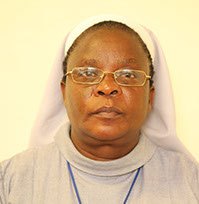
Sister Violet Mupamhadzi
“The zeal or salvation of souls that, today like yesterday, always remains the supreme end of the church’s institutions, rules and laws. Thus, charity and mercy demand that the church, like a good mother, be near her children who feel themselves estranged from her”. [Pope Francis in Mitis Iudex Dominus Iesus #2.]
What is National Marriage Tribunal?
The National Marriage Tribunal is primarily part of the Church’s judicial system. It comes into direct contact with people whose lives have often been scarred by experience of a broken marriage. It upholds the supreme law of the Church. The Marriage Tribunal often deals with people who are still hurting deeply, people who at times feel very alienated from the Church, who are laden with great deal of guilt. The National Marriage Tribunal is to safeguard the rights of individuals and the common good. It promotes justice in all juridical matters. The major portion of the National Marriage Tribunal’s work revolves around the “annulment process” as a response to requests by those who have divorced to investigate whether their former marriages fulfilled the Church’s theological and canonical understanding of marriage.
What is an annulment (a Declaration of Invalidity)?
An annulment is a Declaration of Invalidity, that is, after a thorough review of the marriage the church court’s 1st instance (Tribunal) finds that on the wedding day a particular marriage lacked an element so essential to marriage that the marriage never bound either party from the beginning. Therefore, so far as this particular marriage is concerned, each party is free to marry another person in the Catholic Church, if that is desired. The Declaration of Invalidity, annulment, does not mean there was no marital relationship. The Catholic Church realizes a relationship existed and is not saying that one did not exist but rather the required form was either absent or defective, an impediment of either divine, natural or ecclesiastical law remained undispensed, or consent itself was defective so that the elements necessary for a valid union were not in place.
Our Vision Statement
To reflect and experience Christ in the ministry of justice through the compassionate and equitable application of Church law and protect the rights and dignity of each person without discrimination, to seek truth and justice in all juridical matters, to provide healing and to uphold the supreme law of the Church, that is the salvation of souls.
Purpose
The main purpose of the National Marriage Tribunal procedure is to:
- contribute to the pastoral aims of the Church;
- enable people to marry in the Church;
- have their unions recognised by the Church;
- and participate in the Sacraments.
The Marriage Tribunal does the following:
- Reviews, processes, and adjudicates petitions for invalidity of marriage (annulments)
- Supervises dispensations and permissions for the celebration of marriage in the Catholic Church.
- Performs canonical research for clergy and laity upon request.
- Presents information sessions to inform the public of the work of the Tribunal.
- Offers workshops for clergy, religious and laity concerning the adjudication of matrimonial cases, marriage preparation, prenuptial paperwork processing, and sacramental record keeping.
- Organise counselling sessions that bring healing and evangelise people in order to meet their spiritual needs.
- Mobilise resources for sustainability.
